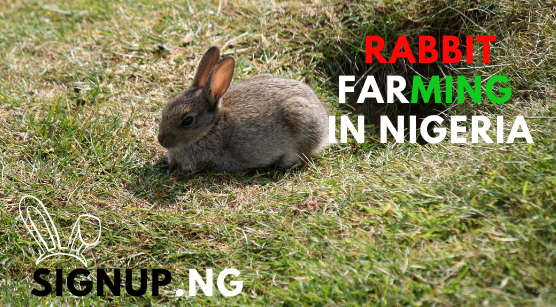Rabbit Farming in Nigeria: Breeding, Feeding, Marketing
Rabbit farming, also known as Cuniculture, has grown in popularity in Nigeria over the years.
Cuniculture is the agricultural activity of breeding and rearing domestic rabbits for meat, fur, or wool as livestock. This activity is also employed by rabbit breeders and amateurs in the improvement and enhancement of rabbit breeds, as well as the display of their achievements.
Rabbits can be raised for a variety of reasons: to be domesticated as pets; to be reared for domestic use of the meat, or to be farmed for profit. Many Nigerians are getting into the rabbit business because of the profit.
Rabbit farming is more profitable, according to experts, because their gestation period is between 28 and 30 days, and 33 days in some situations. The rabbit then gives birth to up to eight, ten, twelve, fifteen, or even eighteen babies (litters) and weans them for six weeks or two months.
Rabbit meat is known to be one of the most nutritious and healthful meats for human consumption, so any of the above three reasons are advantageous, especially the second and third. It is high in vitamins B3, B12, phosphorus, potassium, selenium, and omega 3 and is considered a wonderful source of vitamins and minerals.
As a result, its meat has become extremely popular among well-informed members of the public. The majority of rabbit producers have also stated that meeting consumer expectations is now difficult.
Rabbit farming is easier and more profitable than farming most other animals because it requires minimal capital and a small amount of room, to begin with, plus it is a prolific animal.
Starting with just two does and one buck, you may get 50 rabbits or more in a year. If you start with 10 does (female rabbit) and 5 bucks (male rabbit), you’ll have 250 rabbits or more in a year’s time, and you’ll probably have a steady income.
The best aspect is that practically every part of the rabbit may be exploited for money by a knowledgeable farmer. This means that producers can profit from the rabbit industry through a variety of departments or sources.
Almost every aspect of a rabbit, including its fur and feces, is worth money.
Rabbit Farming In Nigeria
Getting a rabbit business off the ground and completed from start to finish in Nigeria would cost about N45,000 to N100,000.
Because rabbits are more fragile than other animals, rabbit farming requires knowledge and training. It should also be emphasized that a good caging system and extensive instruction are required for a successful farming enterprise. Before getting into the rabbit business, you need to do a lot of research.
The majority of rabbit farmers in Nigeria believe that a rabbit should not come into contact with its urine since it is extremely toxic and can kill them. A container for collecting urine must be included in the cage. When a decent cage is constructed, it solves 70% of the problems for the farmer.
In rabbit farming, the most critical aspects are a good cage with a good water source and a mechanism to collect their urine and feces. Rabbit farmers believe that rabbits can go hours without food but not hours without water, so failing to provide these requirements can lead to failure.
Training is just as crucial as appropriate caging for a rabbit farmer. According to experts, nothing can be done without training. When dough gives birth and the farmer touches the kittens with his bare hands, it is claimed that the dough will refuse to breastfeed the kittens.
The farmer may simply keep losing rabbits without knowing why. Also, health monitoring is critical since a sick rabbit moves slowly, whereas a healthy rabbit moves quickly. These are just a few of the reasons why adequate training is required before starting a rabbit business.
Rabbit Breeding In Nigeria
In Nigeria, breeding rabbits may be extremely stressful, and few farmers endure the first year. When a doe litters (gives birth to) a young rabbit (kit), it takes two months to wean the rabbit and another two months to develop and mature. A rabbit takes four months to breed on average.
A fryer is a rabbit that grows for three to four months before being sold and is typically available because of its short breeding cycle. Because the meat of a fryer chicken is as tender as that of a broiler chicken, you can eat both the meat and the bones. This is for folks who have teeth that are weak.
Not all rabbits, however, take the same amount of time. An adult male rabbit matures for six months before being sold, whereas a female rabbit may stay with the farmer for three to four years before being sold since she is no longer productive.
Feeding
Rabbits eat a wide variety of plants, including leaves, vegetables, and forage. These plants and leaves include some of the most common grasses that can be found growing in many parts of Nigeria. Green plants and root crops are about 90% water and provide protein, minerals, and vitamins. Sweet potatoes, carrots, sugar beets, turnips, and white potatoes are also popular with rabbits. Their properties make them essential for rabbit nourishment.
You can even cultivate them in a separate area of your farm to save money on feeding.
Nevertheless, because most feed millers do not produce feed for rabbits, farmers must formulate their own, maybe due to a scarcity of rabbit farmers. Although, for certain farmers, feed formulation may be far more expensive in the long term, particularly if their rabbit mortality rate is high. In this case, the farmer can turn to rabbit pallet production, which is rather inexpensive.
Feed formulation can also help save money on rabbit food because it allows one to quickly determine the optimum feed that will be helpful and cost-effective. This is what an optimal rabbit feed composition should look like:
- 12% – 18% crude protein
- 14% fiber
- 7% minerals
- Knowing the feed composition and total calorie requirement is important in other to run a profitable rabbit farm
Rabbit Marketing
The biggest disadvantage of rabbit farming in Nigeria is poor marketing. As a result, you may need to invest a lot of work into selling your meat or fur items.
Individuals such as relatives, friends, and coworkers can help start the marketing process by raising awareness. You can take it a step further by contacting restaurants, hotels, cafes, online shopping sites, and supermarkets that can buy huge quantities of rabbit meat.
Locate additional rabbit product end-users, such as the fur industry, and create a commercial relationship with them.
You can even trade across borders. Denmark is the world’s leading fur producer. China, the Netherlands, Russia, and the United States are among the other main producers.
Rabbit farming is one of the parts of a profitable agricultural company that you can start in Nigeria. Commercial rabbit farming can be quite beneficial for entrepreneurs interested in animal husbandry or livestock farming.
Raising rabbits for profit is a time-consuming endeavor that is not for the faint of heart (not a “get-rich-quick” venture). It can, however, be a highly rewarding and even successful way to make a living for someone with good stewardship skills who isn’t scared of a little hard work.






